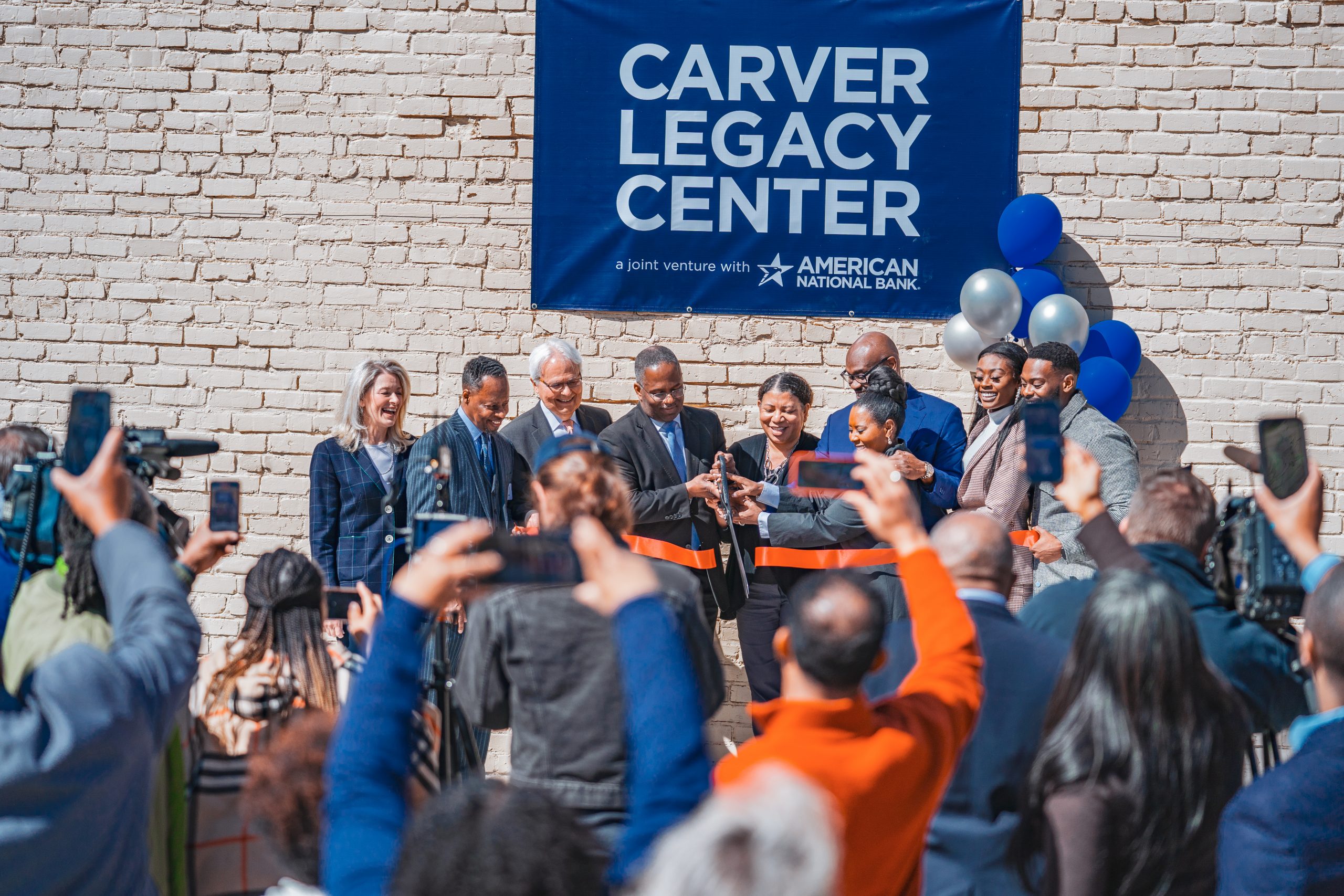
Carver Legacy Center, a Black-owned financial and wealth building system, opens in North Omaha
More Videos
Published: Tuesday, May 3, 2022
The Carver Legacy Center, an innovative collaborative approach to building black businesses and thriving communities was publicly announced on August 30, 2020 and formally opened on April 4, 2022.
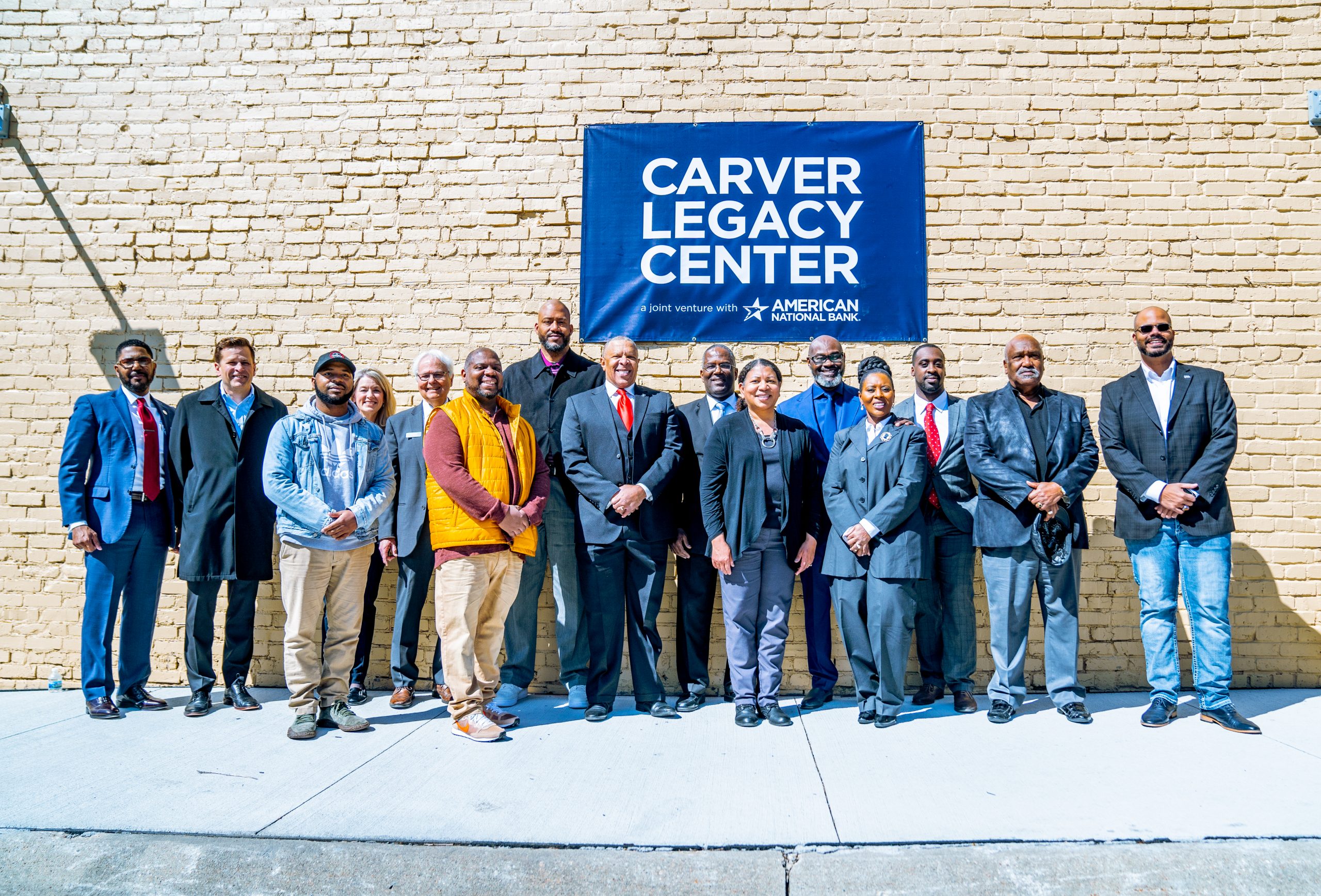
Carver Legacy Center Owners and Partners with Elected Officials and Strategic Collaborators (April 4, 2022 Soft Opening)
After nearly five years of behind the scenes work to develop formal partnerships, the collaboration is bringing new life to the historic Carver building located in the village at 24th and Lake.
Co-founders and co-owners Willie and Yolanda Barney and Martin, and Lynnell Williams have created a joint venture with American National Bank to make it happen.
The focus of the Center is creating wealth for African-Americans and North Omaha residents through business ownership, home ownership and community ownership.
“18 months ago we stood before the community and promised to renovate the historic Carver building and launch a new financial center, develop a Hub and Accelerator for small businesses where they can launch, scale and grow, and create a store and pop-up incubator where Black businesses and North Omaha entrepreneurs can feature their products and services. Today, we are back to have you experience it for yourself. Welcome to the Carver Legacy Center,” said Willie Barney, co-owner and co-founder.
“For over 22 years, Yolanda and I have worked to launch, support, promote and expand black businesses.”
“We are excited to partner with Martin and Lynnell Williams and American National Bank. To be able to do this in the historic building where the first Black-owned financial institution in Nebraska was opened 78 years ago, the place where Whitney Young launched a program to increase Black homeownership and the building that housed the offices of some of Omaha’s history-making black leaders is especially meaningful to all of us.”
The Carver Legacy Center will have several components.
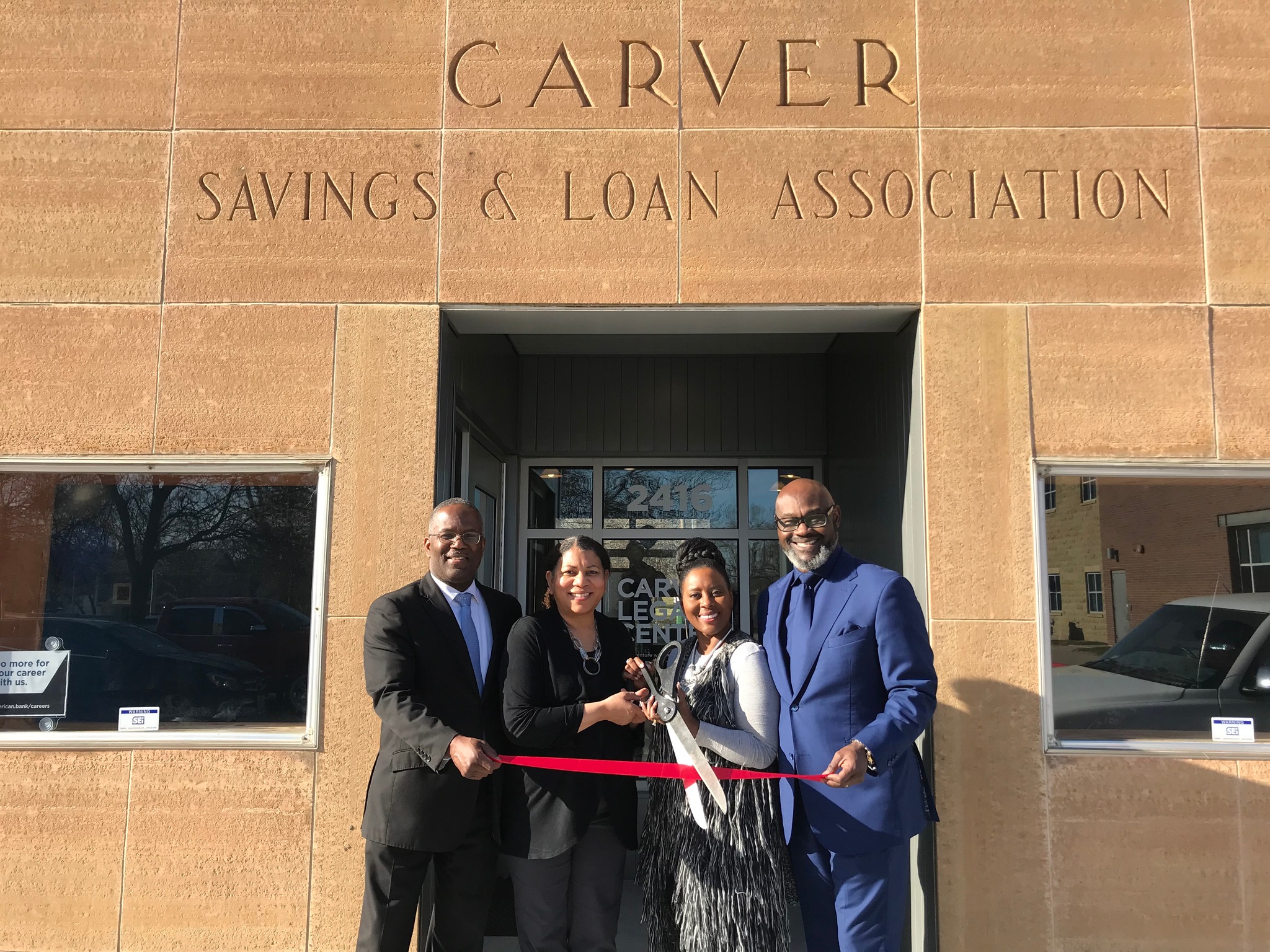
Carver Legacy Center Co-owners and Co-Founders: Willie and Yolanda Barney and Lynnell and Martin Williams. Carver Savings and Loan, the first Black-owned financial institution in the state of Nebraska opened in 1944 and closed in the mid 1960’s. The Carver Legacy Center owners purchased the building and partnered with American National Bank to bring financial services, hubs and accelerators and wealth building systems back to 24th and Lake.
CARVER LEGACY FINANCIAL SERVICES
The Carver Legacy Financial Services Center, a joint venture with American National Bank, will bring banking services to 24th and Lake, and provide increased access to credit and capital for Black businesses and North Omaha residents.
With the joint venture with American National Bank, individuals, families, organizations, churches and businesses can open accounts and make deposits at any American National Bank location by designating a Carver Legacy Account. American National Bank is a member of the FDIC which means deposits are insured.
Loans leveraged by these deposits will benefit Black businesses and individuals, and North Omaha residents and businesses.
In Phase III to come later, the Carver at 24th and Lake is working to become a full service branch which will allow all banking services to be provided at that location.
“We are excited about partnering with the Barney and Williams families to make this happen at this historic location,” said John Kotouc, Co-chairman of American National Bank. “We are bringing our banking experience, expertise and considerable investments to this collaborative approach.”
“American National Bank is committed to supporting this Black-owned business and initiative and we want this to serve as another catalyst for further community-based development in North Omaha.”
Kotouc also emphasizes that this is not an exclusive situation. “We will play a role, but we challenge and encourage other financial institutions to also get involved with this project. It will benefit the entire community.”
In addition to the financial center, the Carver Legacy Center will house three other important components: Hub & Accelerators; Revive Omaha Store and Pop-Up Incubator; and Legacy Wealth Center.
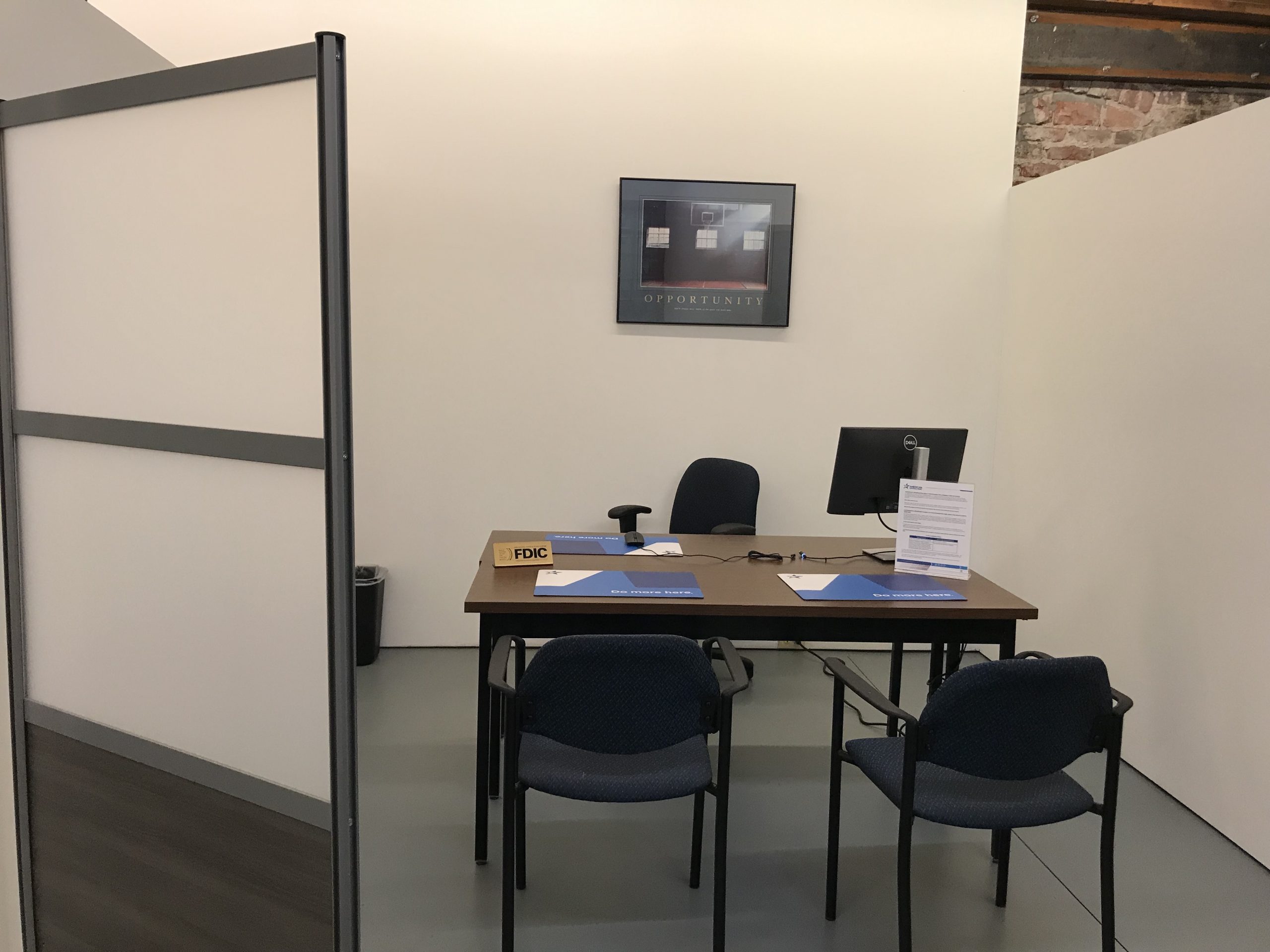
HUB AND ACCELERATORS
The Hub will be the new home for Revive Omaha and the Revive Black Business Network. It will also feature shared office and meeting space for the DreamBusiness Accelerator and other business collaborators.
“Nine years ago, we created the Revive Black Business Network which has connected with over 300 black owned businesses,” said Yolanda Barney, co founder and Vice President of SMB Enterprises.
“One of the things we have heard most consistently is we need more funds to launch and expand our business. We can’t get loans. Entrepreneurs have also told us they would like support with finance, sales, technology, admin, marketing and branding.”
While the Financial Center will help bring funding together, the Hub will be a place to help entrepreneurs with connecting with other business owners and resources, launching their vision and provide technical assistance to help take their businesses to scale.
The Accelerators run by the Barneys and Williams will also connect black businesses to supplier diversity and procurement opportunities with major companies.
“We are excited to be open for business at the Carver Legacy Center. The process of building and introducing this financial services center was a work of passion and commitment to our community,” said Martin Williams, co-owner and co-founder.
“We have worked for the past 30 years on cultural approaches to launch and grow successful businesses.”
He and his wife Lynnell are founders and strategic leaders of Ambassador Worship Center and have established several businesses nationally and internationally, including Barak II which is the partner with the Carver.
“Using what we have learned by helping others to launch million dollar businesses, we are blessed to be a part of bringing the Carver back to life and helping families to build generational wealth.”
The Hub will utilize a collaborative approach that all three families have dedicated themselves to over many years. The Revive Black Business Network will operate a start-up accelerator and the Williams will facilitate a scale-up accelerator through their DreamBusiness program.
Other businesses will bring their specific expertise to the table. Hayes and Associates and Advance Tax Solutions will support businesses with finance, accounting and tax services. Technology Consulting Solutions and others will assist with technology.
Business Seals and others will assist with business plans and financial forecasts. PPRP Innovations will support market research, pricing and market growth strategies. Other black owned businesses will assist with social media, branding, marketing, HR and operations.
“We wanted to create one place where an entrepreneur can go from idea to launch and then to scale and expansion,” said Willie Barney.
“We are also finalizing partnerships with other specialists and organizations who will offer services at the Center.”
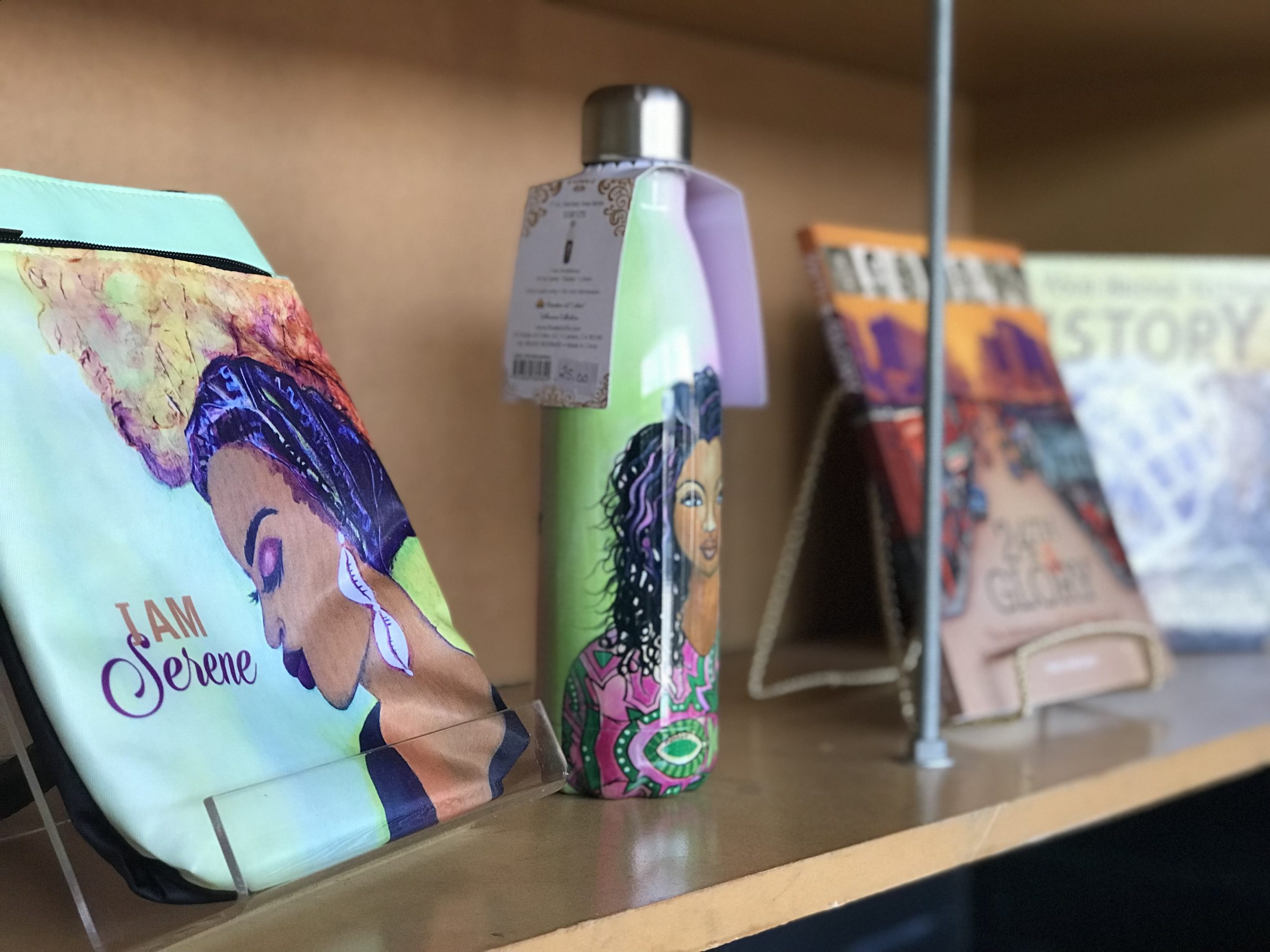
REVIVE OMAHA STORE AND POP-UP INCUBATOR
Another key component to the Center will be the Revive Store and Pop Up Incubator. The space where Big Mama’s sandwich shop operated will be multi-use.
It will feature products created by African-Americans and North Omaha residents. The space will also serve as a pop-up incubator for businesses that would like to introduce their products to the community.
“It’s a perfect space for a small business to host an event to showcase their products while also giving them a chance to test market and gather valuable experience” said Yolanda Barney.
“Our goal is to help them step out into their entrepreneurship journey and then hopefully locate a business in the 24th and Lake District or another key corridor in North Omaha.”
LEGACY WEALTH CENTER
The final piece of the four part strategy is the Legacy Wealth Center. A core element in the vision is financial empowerment and community ownership. The team wants to see residents save, improve credit scores, purchase insurance, invest in stocks, purchase land and homes, become business owners and pass wealth to future generations.
The Legacy Wealth Center will feature workshops, special events and classes to help residents with accomplishing their financial goals. We will have guest speakers and experts in their fields share their time and talent with members. Participants will learn more about turning their gifts and talents into revenue producing businesses and multiple streams of income.
“This is the part that gets me most excited,” said Lynnell Williams. “We want to teach families everything we have learned about building wealth. That starts with breaking cycles and implementing discipline in the areas of finance.”
“Carver Legacy Center is committed to bridging the gap for all ages and ensuring that our young ones get a head start on understanding money matters! Our future depends on how well we financially prepare our youth.”
The Carver Legacy Center will also house the Revive Black Business Network which has national strategic advisors, including Dr. Pamela Jolly, Dr. Randal Pinkett and Tawanna Black. They will also support and offer wealth building classes and sessions.
As the Carver Legacy Center moves through the phases, the team will also work with local and national partners to create collective investment opportunities. This will be a platform to pool and leverage resources.
“We believe the reopening of the Carver is like digging up the wells that made North Omaha a great place to live, worship, work and own homes and businesses,” said Martin Williams. “As we move forward, we will work with others to help residents to create wealth and ownership.”
COLLABORATION
Other local collaborators include: Omaha Economic Development Corporation, Nebraska Enterprise Fund, Family Housing Advisory Services, Omaha 100, Shift Omaha, Creighton University, Metropolitan Community College and the University of Nebraska – UNO.
“American National Bank is committed to helping to develop strong communities and we are very supportive of many organizations in North Omaha,” said Wende Kotouc.
“We have worked with Willie and Yolanda and Martin and Lynnell for many years and they have consistently worked with others to produce measurable results. They have shown again and again they know how to make things happen. We are excited to be involved in this effort. Earnest White who has a long history of community involvement will be our ambassador to Carver.”
Willie Barney added, “We want to specifically thank Michael Maroney, Ben Gray, the City of Omaha Mayors Office and Planning Department, Lorie Lewis, Ernest White, Ryan Meyer, Steph Gould, Jackie Vinci, Patti Kuhre, Pamela Jolly and Katie Weitz for their support as we have worked to develop this Center.”
“We believe the Carver will be an important piece of accelerating progress at 24th and Lake, in North Omaha and for African-American communities.”
“Omaha is known for wealth, we want it to be known for creating Black wealth as well and rebuilding a thriving North Omaha.”
You may like
-


Step-Up Omaha interns gain valuable work experience at UNMC
-


Ashlei Spivey running for State Senate, marches towards general election
-


Curtis Morgan to lead MBK Omaha programs for Empowerment Network
-


1,200+ attend Rebuilding the Village Conference featuring Eric Thomas
-


2024 Revive Omaha Black Business Guide
-


New cohorts prepare to launch…Leadership, Fund Development, Wealth Building & Career Advancement
Community News
Step-Up Omaha interns gain valuable work experience at UNMC

Front row from left: Evelyn Grixby, UNMC employee relations programs coordinator; Alona Wilson; Jennifer Esqueda; Amari Johnson; Lakeisha Bonam of Step-Up Omaha; and Linda Cunningham, associate director for UNMC Human Resources. Back row from left: NeRae Davis; Niara Bowie-Berry; Randy Smith; Mukundaha Devanaboyina; Julia Livingston of Step-Up Omaha; and John Skradski of Step-Up Omaha.
Published: July 21, 2024
WRITTEN BY Jeff Robb, UNMC strategic communications
Step-Up Omaha interns are back at UNMC for another summer of work experience and learning opportunities around the academic medical center.
Step-Up Omaha is an initiative of the Empowerment Network, the City of Omaha and community partners to give youths summer job training and work experience.
Since 2016, UNMC has participated by hosting interns in a variety of departments, centers and offices around the campus. This year, the program, which started June 17, has eight interns.
Evelyn Grixby, employee relations programs coordinator in UNMC Human Resources and the Step-Up Omaha program coordinator, said UNMC’s Step-Up internship program is a coordinated effort with the worksite partners to invest in the interns and intentionally provide them valuable outcomes by the end of summer.
The interns receive job shadowing, mentoring, career guidance and networking opportunities, Grixby said.
“In the short period of time that the interns are on campus, they gain soft skills training that leave them feeling empowered, inspired, connected and more confident about their career interest,” she said.
Linda Cunningham, associate director for UNMC Human Resources, said the department is excited to welcome the 2024 interns to UNMC.
Cunningham credited Grixby for her dedicated efforts to the program. She also thanked participating UNMC departments, saying they are mentoring future leaders while also embracing the fresh, new perspectives shared by the interns.
Said Cunningham, “Our campus remains committed to providing thoughtfully designed and impactful learning experiences for our Step-Up interns in a supportive environment that exceeds their expectations and hones their curiosity for career exploration and success.
“We encourage each of them to take full advantage of the rich opportunity, resources and connections available to them during this experience.”
Intern Randy Smith is back at UNMC for a fourth summer through the program, this time working with the UNMC Office of the Vice Chancellor for Research. Smith, who is studying psychology at Metropolitan Community College, said he was drawn by UNMC’s environment of friendly people.
“It’s great working along with people who are like-minded, driving towards a better future in technology and health care,” he said.
This summer’s interns and their departments are:
- Jennifer Esqueda, UNMC Human Resources
- Alona Wilson, UNMC Human Resources and the Office of the Chancellor
- Randy Smith, UNMC Office of the Vice Chancellor for Research
- NeRae Davis, UNMC Facilities Management and Planning
- Amari Johnson, UNMC Office of Inclusion
- Mukundaha Devanaboyina, Munroe-Meyer Institute community engagement
- Ajay Repakula, Munroe-Meyer Institute Trailblazers Program and administration
- Niara Bowie-Berry, UNMC Global Center for Health Security
Community News
Ashlei Spivey running for State Senate, marches towards general election

Published: July 21, 2024
Ashlei Spivey is running to be the next representative for Nebraska Legislative District 13. She is a mother, wife, small business owner, community advocate, and lifelong resident of LD 13. She advanced to the general election by the slimmest of margins.
“Our democracy is at a crossroads. We deserve elected officials that represent the experiences and can uplift the voices of everyday residents to create policy that betters the lives of all communities,” said Spivey.
Her background in nonprofit leadership has fueled her dedication to advocating for access and opportunity in education, healthcare, and economic well-being. She has worked hard to develop strong relationships in Omaha and across the state. Her passion for her community comes through as she pushes for change.
“Growing up in North Omaha, I have witnessed firsthand the challenges the community faces as well as the beauty and potential of the district,” she continued.
Ashlei has worked with others to solve some of the community’s most pressing and complex issues. As a representative, Spivey says she will champion policies that directly benefit the district and state.
Her areas of focus include:
- Property Tax Relief
- Affordable Housing
- Accessible Public Health Systems
- Protecting and Advancing Reproductive Rights
- Thriving Public Schools
- Economic Wellbeing
- Continued Investment in Small Businesses
Spivey is the Founder and Executive Director of I Be Black Girl, an impactful non-profit organization leading measurable change in the community. She has a background which includes non-profit leadership, entrepreneurship, philanthropic investments and advocacy. Spivey is also a member of Sigma Gamma Rho Sorority, Inc.
Ashlei graduated from Jackson State University with a degree in communications and marketing and continued her education at the University of Texas Arlington, for her master’s degree in urban social planning. She returned to Omaha and immediately engaged with her community working to help identify assets and address gaps.
Spivey is nationally recognized for her leadership and has received numerous Awards and Accolades:
- Board Member, Women’s Funding Network
- Former Board President, ACLU of Nebraska
- MIT REAP Participant (2022)
- Ten Outstanding Young Omahans
- The Chamber YP Changemaker
- Urban League YP Leadership Award
- WCA’s Tribute to Women
- 2023 J.M. Kaplan Innovation Prize Awardee
She has been featured in Forbes and Essence magazines, identified by USA Today as the 2024 Nebraska Woman of the Year and celebrated by the Midlands Business Journey 40 under 40.
“I am ready to hit the ground running day one, bringing my community back to the Capitol. I am the right next choice for legislative district 13 and look forward to earning votes and trust,” said Spivey.
Learn more about Ashlei and her priorities:
- Website: https://www.ashleifornebraska.com/
Careers
Curtis Morgan to lead MBK Omaha programs for Empowerment Network

Published: July 21, 2024
The Empowerment Network is pleased to announce the addition of Curtis Morgan as the My Brother’s Keeper (MBK) Omaha Program Manager. Morgan brings a wealth of experience in public administration, youth development, community engagement, and nonprofit management to his new role.
Morgan has spent more than a decade working in various leadership roles, demonstrating a deep commitment to fostering community development and youth empowerment.
He previously served as program coordinator for TeamMates, a school-based mentoring program from Omaha Public Schools, where he recruited community members to mentor students in schools across the district. Morgan has also served as the re-engagement specialists for D2 Center, where he helped high school students with chronic absenteeism and truancy find a path to graduation. Additionally, he’s managed and facilitated after-school programming for elementary and middle school students in North and South Omaha. As a proud member of Kappa Alpha Psi Fraternity, Inc., he also volunteers as the director of the Omaha Kappa League.
“I am humbled and truly honored to join the Empowerment Network team as the MBK Omaha program manager,” said Morgan. “I’ve had the pleasure of volunteering and participating in several Empowerment Networks events and collaborations over the last decade. Now I’ll have the opportunity to lead a collaborative effort with a mission that is closely related to my passion for mentoring and youth advocacy. Together, we will fill the voids that exist for young men of color in our community and provide them the tools they need to be successful.”
In his new role, Morgan will work with Jonathan Chapman, vice president of community collaboratives, and the Cradle to Career director, to lead the MBK Model Community initiatives for the city of Omaha. This initiative aims to achieve a measurable shift in outcomes for boys and young men of color. This role will play a pivotal part in strengthening local collaborations and establishing new partnerships to help the community achieve the six key milestones to success identified by the Obama Foundation’s MBK Alliance.
“We are excited to welcome Mr. Morgan as the MBK Omaha Program Manager,” said Willie Barney, founder and CEO, Empowerment Network. “His dedication to fostering community development and youth empowerment aligns perfectly with our mission, and we look forward to the innovative and impactful programs he will help us create and implement.”
Supported in part by the My Brother’s Keeper Alliance, a program of The Obama Foundation, the Empowerment Network is dedicated to building safe and thriving communities through economic, educational and social success. Programs like Omaha 360 and Step-Up Omaha exemplify these efforts. My Brother’s Keeper Alliance promotes supportive communities for boys and young men of color, ensuring they feel valued and have clear pathways to opportunity.
With Bachelor’s degrees in Sociology and Psychology from Nebraska Wesleyan University, and a Master’s degree in Public Administration from Bellevue University, Morgan is currently completing his certification in Fundraising Management at University of Nebraska-Omaha.
To stay connected with the Empowerment Network and learn about upcoming events, visit https://empoweromaha.com/. Follow Empowerment Network on Facebook at Facebook.com/EmpowermentNetwork.
###
About the Empowerment Network
The Empowerment Network is a nonprofit organization committed to advancing economic, social, and civic progress within Omaha’s African American community, North Omaha and the region. Through collaborative efforts and innovative initiatives, the Empowerment Network strives to create opportunities for empowerment and transformation in every zip code and neighborhood in Omaha and beyond.
Vicki Quaites-Ferris
The Empowerment Network
402-502-5153

